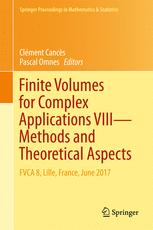

Most ebook files are in PDF format, so you can easily read them using various software such as Foxit Reader or directly on the Google Chrome browser.
Some ebook files are released by publishers in other formats such as .awz, .mobi, .epub, .fb2, etc. You may need to install specific software to read these formats on mobile/PC, such as Calibre.
Please read the tutorial at this link: https://ebookbell.com/faq
We offer FREE conversion to the popular formats you request; however, this may take some time. Therefore, right after payment, please email us, and we will try to provide the service as quickly as possible.
For some exceptional file formats or broken links (if any), please refrain from opening any disputes. Instead, email us first, and we will try to assist within a maximum of 6 hours.
EbookBell Team

4.7
16 reviewsThis first volume of the proceedings of the 8th conference on "Finite Volumes for Complex Applications" (Lille, June 2017) covers various topics including convergence and stability analysis, as well as investigations of these methods from the point of view of compatibility with physical principles. It collects together the focused invited papers comparing advanced numerical methods for Stokes and Navier–Stokes equations on a benchmark, as well as reviewed contributions from internationally leading researchers in the field of analysis of finite volume and related methods, offering a comprehensive overview of the state of the art in the field.
The finite volume method in its various forms is a space discretization technique for partial differential equations based on the fundamental physical principle of conservation, and recent decades have brought significant advances in the theoretical understanding of the method. Many finite volume methods preserve further qualitative or asymptotic properties, including maximum principles, dissipativity, monotone decay of free energy, and asymptotic stability. Due to these properties, finite volume methods belong to the wider class of compatible discretization methods, which preserve qualitative properties of continuous problems at the discrete level. This structural approach to the discretization of partial differential equations becomes particularly important for multiphysics and multiscale applications.
The book is a valuable resource for researchers, PhD and master’s level students in numerical analysis, scientific computing and related fields such as partial differential equations, as well as engineers working in numerical modeling and simulations.